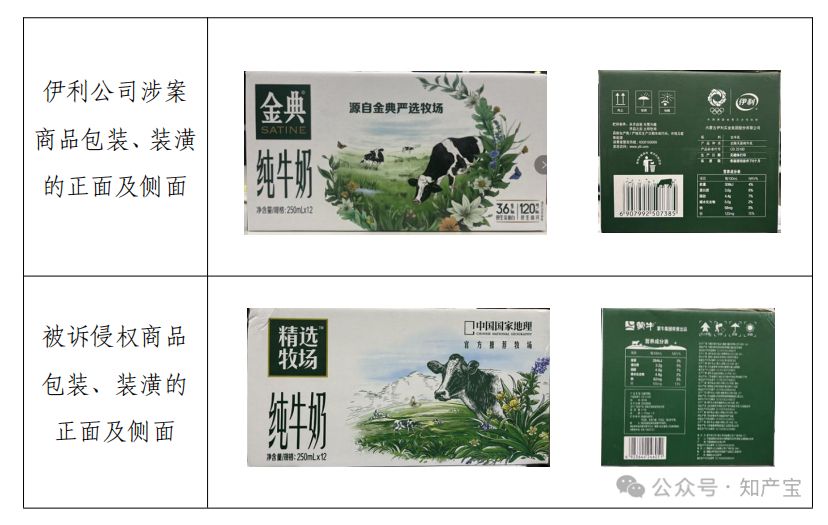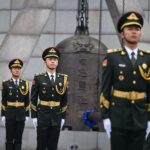The focus of the second trial centered on whether the packaging and trade dress of the products claimed by Yili constituted distinctive packaging and trade dress with a certain influence, and whether the accused actions constituted acts of unfair competition by unauthorized use of another’s distinctive product packaging and trade dress.
Recently, the unfair competition dispute between dairy giants Yili and Mengniu reached a final judgment. The Jiangsu High Court dismissed the appeal and upheld the original ruling: requiring Inner Mongolia Mengniu Dairy (Group) Co., Ltd. and a supermarket in Jiangning District, Nanjing to immediately cease the involved unfair competition acts; and ordering Inner Mongolia Mengniu Dairy (Group) Co., Ltd. to pay compensation of 5 million yuan to Inner Mongolia Yili Industrial Group Co., Ltd. for economic losses and reasonable expenses incurred to stop the infringement within fifteen days of the judgment taking effect.
The products involved in this case were the pure milk brands “Jindian” and “Selected Pastures” owned by the two dairy giants. The plaintiff Yili claimed that the commercial identifiers of the “Jindian” pure milk constituted packaging and trade dress with a certain influence, and that the trade dress of the accused “Selected Pastures” pure milk was highly similar to the involved trade dress, likely to cause consumer confusion, thus constituting unfair competition under the Anti-Unfair Competition Law.
Accordingly, Yili requested that Mengniu be ordered to immediately cease the unfair competition act of using packaging and trade dress identical or similar to the distinctive product packaging and trade dress; pay compensation of 20 million yuan for economic losses and reasonable expenses; and publish a statement in newspapers to eliminate the impact.
Mengniu argued that the green, rectangular outer packaging design, the layout with “trademark + product name + specifications” on one side and illustrations on the other, and design elements such as pastures and cows were common in the milk industry. The disputed trademark was a graphic trademark composed of elements like cows, grassland, houses, and clouds, which aligned with the general public’s perception of pastures. The composition style and image portrayal were realistic and lacked significant originality.
Therefore, this graphic was easily recognized as commonly used promotional imagery in the industry, lacking the distinctive characteristics required of a trademark and unable to effectively differentiate the product’s origin.
From the case perspective, the focus of the second trial centered on: whether the packaging and trade dress of the products claimed by Yili constituted distinctive packaging and trade dress with a certain influence; and whether the accused actions constituted acts of unfair competition by unauthorized use of another’s distinctive product packaging and trade dress.
The Jiangsu High Court stated in the judgment that although design elements like cows, pastures, flowers, plants, and green colors are common in dairy milk packaging and trade dress, the specific expression of each element, how elements are combined and arranged, color selection, and coordination can result in different design styles and effects. The presence of common design elements in the product packaging and trade dress does not necessarily mean it lacks distinctiveness or the ability to identify the product’s origin.
Secondly, the evidence provided by Yili regarding the知名度 of the product packaging and trade dress formed a chain of evidence, proving that before Mengniu’s accused “Selected Pastures” product with infringing packaging and trade dress was launched in 2023, Yili’s continuous use and extensive promotion had given the product packaging and trade dress a certain market知名度 and influence, serving to differentiate the product’s origin.
Thus, the packaging and trade dress of the products claimed by Yili did constitute distinctive packaging and trade dress with a certain influence.
Additionally, based on the differences between Yili’s “Jindian” and Mengniu’s “Selected Pastures” packaging and trade dress, these differences were insufficient to create a distinct overall visual effect. The use of similar packaging and trade dress by Mengniu’s infringing products was likely to cause consumer confusion and misidentification. The court ruled that the accused actions constituted acts of unfair competition by unauthorized use of another’s distinctive product packaging and trade dress.
Based on the above assessment, the Jiangsu High Court determined that the appeals from both Yili and Mengniu could not be sustained and should be dismissed. The first-instance judgment was clear in facts and correct in law application, and should be upheld.
It is worth noting that this is not the first time Mengniu has been ruled against for unfair competition due to product packaging and trade dress





